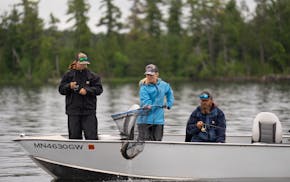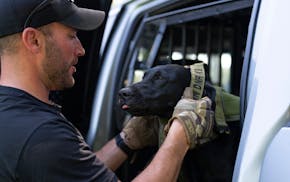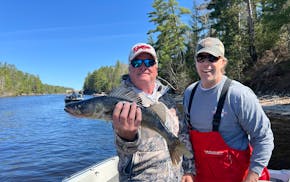Selling bikes is interesting, but being in the woods in spring, gathering maple sap, is addictive, a distinction Mark and Melinda Spinler know well.
The Spinlers live about 7 miles outside of Grand Marais, the small town on the North Shore that was more quaint than trendy when the couple moved there in 1984.
Mountain biking wasn't yet a thing when the Spinlers arrived in Grand Marais. But they were into it, and they opened the town's first bike shop, which they operated for about 30 years before selling it.
Now, instead of two-wheelers, they peddle wood-burning stoves. Also, Mark has a chimney-cleaning business. And together, come March, he and Melinda, both 65, decamp to two relatively small stands of maple trees — one they own and one the state owns — to begin a process that will produce about 270 gallons of syrup, which they market to local businesses.
"Northern Minnesota is a wonderful place to live," Melinda said. "But a hard place to make a living."
It's the syrup business that has embroiled the Spinlers in a standoff with the Minnesota Department of Natural Resources that speaks to a larger debate about public lands and their proper use. Similar issues have affected northeast Minnesota residents since at least 1926, when the border region that would become the Boundary Waters Canoe Area Wilderness was first established as a roadless area.
But the Spinlers' brouhaha has nothing to do with paddling or camping.
At issue instead is a 13-acre tract of relatively isolated state land adjoining their property that they have leased from the DNR for about 25 years.
Unlike the red and white pines, balsam, and spruce that most Minnesotans associate with the Grand Marais area, this parcel features mature sugar maple trees, a species whose highest and best use, the Spinlers say, is producing sap.
"The only other thing maple is used for up here is firewood," Mark said.
Earlier this year, when the Spinlers' most recent 10-year lease expired on the 13-acre parcel, the Department of Natural Resources notified them the agreement wouldn't be renewed and that at least some maples on the tract might be cut.
"Cutting the trees doesn't make sense," he said. "Money the DNR would get from cutting the maples is a fraction of what we pay [about $200 annually] over time for our tapping lease."
Jon Drimel, DNR forest operations section manager in St. Paul, said no DNR policy guides local forestry managers about lease operations like the Spinlers'. Instead, on a case-by-case basis, competing interests are considered when deciding whether to grant long-term leases on state land.
"When considering a lease, there might be no conflicting uses," Drimel said. "Or perhaps there are cultural considerations, forest management considerations or old growth policies, as examples, that conflict with the proposed use. Sometimes these can be mitigated, and sometimes not."
In either case, no one is allowed to leave equipment on leased land indefinitely.
Drimel said the DNR awards about 20 maple-tapping permits on state land annually. Most are to hobbyists who pay $25 to tap 100 or fewer trees the old-fashioned way, with one tap and one bag, or bucket, affixed to a single tree, rather than the more complex plastic tubing systems larger operations use.
The Spinlers use tubes on their 13 leased acres, and they leave the system suspended in maples about chest high all year.
"We have about $100,000 invested in our operation," Mark said. "It wouldn't be feasible to take the tubes down and put them back up each year. It would put us out of business."
Mike Hofer, 64, is a neighbor of the Spinlers who also taps maple trees in spring. A board member of the 150-member Minnesota Maple Syrup Producers Association, he says the bigger problem is that the relatively few people in Minnesota who produce syrup for income get too little consideration from the DNR.
Timber producers are given access to thousands of acres of Minnesota forests each year, Hofer noted. So are ATV trail builders, cabin owners and others.
But Hofer said Mike Young, area DNR forest supervisor in Two Harbors, and Lonnie Lilly, Young's boss in Grand Rapids, told him long-term leasing (as opposed to annual) of state land for sap collecting is something the DNR no longer wants to do. Young said the same to the Spinlers in a letter early this year.
"DNR has shifted away from long-term lease arrangements for commercial tapping on state forest land," Young wrote.
Hofer said income from syrup is important to him, the Spinlers and other producers. But more important, he said, is continuing a Minnesota tradition that dates back before statehood, and one that enhances people's appreciation of the state's forests.
"To be in the woods in spring when the snow is melting and birds are migrating back to the north country is wonderful," he said, adding that he takes down his tubing system annually, in accordance with his more recently issued DNR permit.
Drimel, of the DNR, said that maples and other northern hardwoods such as basswood and oak make up only about 107,000 acres of the 4 million acres of forests the DNR manages. Consequently the hardwoods pale compared to pines and aspens as income producers for loggers as well as the DNR. They also receive less consideration in forest management decisions the DNR makes, he said, which might explain why the Spinlers' lease and its equipment-removal clause weren't more closely monitored by the DNR in the past quarter-century.
Still, he said, the DNR must consider other forest users in these and similar situations. What if a hunter or skier is in the woods and sees a tubing system hanging from trees? Is his or her use of that public land inhibited? And what about deer, moose and other wildlife? Can they move through the tubing system without a problem?
For now, the DNR has told the Spinlers they can keep their tubing up on the 13 acres. A local legislator is lobbying the DNR on the couple's behalf, and sometime in 2025, the Spinlers will be awarded a new DNR lease — or not.
"The Spinlers' situation is unique," Drimel said. "The challenge is finding some middle ground that addresses what they need for their operation with what the DNR can accept in its obligation to properly manage a public resource."
Whatever happens, Hofer hopes the DNR more formally recognizes the state's maple syrup producers and grants more of their relatively minimalist requests to access state lands.
"I'd like to keep tapping trees another 10 years," he said.

Anderson: In early June, Minnesota fish are begging to be caught. Won't you help?

Anderson: Tails wagging, DNR officers' dogs find lost people and missing evidence
Anderson: Punish poachers more
Anderson: The Chainsaw Sisters Saloon is gone, but the Echo Trail is still a pathway to possibilities


